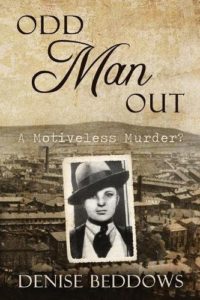Denise Beddows took joint second place in the WforW Georgina Hawtrey-Woore Award for Independent Authors: Non-Fiction Category with the brilliant and engrossing Odd Man Out. And here she tells us of a typical day in her life.
Many of us recall with warm nostalgia the bedtime stories our mothers used to read to us. My late mother, a former wartime bus conductress in Lancashire, was an avid reader of lurid press accounts of murder. She could recount every detail of every murder of the twentieth century, and recount them she did – every time I begged a bedtime story. Not for me the gentle tales of Noddy or Peter Rabbit. No, tragic Ruth Ellis, last woman hanged in Britain, and Haigh, the acid bath murderer, were my bedtime companions. So, it came as a surprise to me when, only recently, I learned that one of my mother’s fellow ‘clippies’ was executed for murder; a murder Mum never once mentioned.
My curiosity piqued, I set about researching the case. Contemporaneous press reports were brief, perhaps because, although the accused confessed to the crime, she never said why she did it. She did not give evidence in court and nor did she appeal her death sentence. So, had middle-aged Margaret Allen brutally beaten to death Nancy Chadwick, an elderly woman whom she barely knew, and if so, why?
The victim, an eccentric and parsimonious scrounger, was described by her own nephew as ‘abnormal’. The killer, too, was unconventional to say the least. Allen, the twentieth of twenty-two children, born in extreme poverty, believed she was really a man and insisted on being addressed as ‘Bill’. The only explanation Allen offered for the killing was ‘I must have been in one of my funny moods’. The police presented the case as a murder in furtherance of a robbery, albeit that Allen was penniless when arrested. Clearly, the case warranted further investigation.
Close scrutiny of the records showed that much crucial evidence was suppressed by police at the time. Numerous witnesses claimed they had seen the victim hours after the alleged time of death. Statements by Allen’s family, putting her three miles away at the time of the murder, were neither tested nor put before the court. Scurrilous allegations made in court about Allen’s character and behaviour were demonstrably untrue, and public opinion was prejudiced by allegations of a lesbian relationship between Allen and her close friend Annie Cook. Seemingly, like Ruth Ellis, Allen was hanged as much for what she was as for what she was alleged to have done.
Drawing on historic interviews, I also contacted people who had met Allen. Their recollections were of a kind and generous person, not at all the violent, brutish character portrayed in press reports. Although, after one of the shortest murder trials on record, the judge deemed this a ‘motiveless, senseless’ killing, I uncovered a very obvious potential motive.
There comes a point, however, when most researchers experience qualms about delving intrusively into a stranger’s background. Indeed, I questioned my own motives in exploring the intimate detail of Allen’s life. Was I seeking to establish Allen’s motive, to find reason to mitigate this awful crime, and, perhaps, even to prove her innocence, or was this simply morbid curiosity? After much soul-searching, I persuaded myself that, whilst curiosity was my motivation, my aim was to give a voice to a troubled and disadvantaged transgendered individual, a troubled soul who chose to say very little about herself or her crime but went quietly and with dignity to the scaffold. As Margaret’s executioner, Albert Pierrepoint, famously said: ‘murderers are so often ordinary people caught on the wrong foot’.
A volunteer researcher for several history and heritage groups, Denise regularly gives talks to a variety of community groups. She is married with one grown-up daughter.
Denise, who also writes under the name of D J Kelly, has also written the well received Buckinghamshire Spies & Subversives, The Famous and Infamous of The Chalfonts and Gerrards Cross, Chalfont St Peter and Gerrards Cross at War, A Wistful Eye – The Tragedy of a Titanic Shipwright, Running with Crows – The Life and Death of a Black and Tan, Homes for Heroes – Life in a 1940s Prefab (ghost written with Joan Brant).


